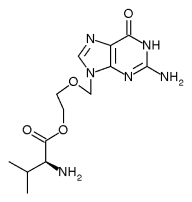The Food and Drug Administration has approved valacyclovir for use as suppressive therapy to reduce the risk of heterosexual transmission of genital herpes to susceptible partners.
The approval is limited to otherwise healthy adults with competent immune systems, and suppressive therapy should be used in combination with "safer sex practices," the FDA said in a statement.
Approval was based on the results of a landmark, international trial of more than 1,000 heterosexual, monogamous, immunocompetent couples. The study showed that a daily suppressive dose of 500 mg taken by the infected partner reduced transmission of symptomatic genital herpes (herpes simplex virus type 2) to the uninfected partner by 75% over 8 months. When asymptomatic infections were included, the risk of transmission decreased by 50%, which was still a significant reduction.
"Every doctor providing care for persons with [genital] herpes should be aware of the data, aware of the efficacy, and should make their patients understand it is one option they can employ to help protect their partners," Dr. H. Hunter Handsfield, professor of medicine at the University of Washington, Seattle, said in an interview.
Available since 1995, valacyclovir (Valtrex) was previously approved for the treatment or suppression of genital herpes in otherwise healthy people and suppression of recurrent genital herpes in HIV-infected individuals.
The rationale behind using valacyclovir to reduce transmission rates is that the drug suppresses recurrences and reduces viral shedding, according to GlaxoSmithKline, which markets Valtrex.
Dr. Handsfield was the FDA's invited guest expert at a meeting of the agency's Antiviral Drugs Advisory Committee in May, during which committee members unanimously recommended that valacyclovir be approved for this indication in monogamous, heterosexual couples, the population studied in the trial. (Dr. Handsfield was not an investigator in this trial, but has done research for GlaxoSmithKline and is on the company's speakers' bureau.)
At that meeting, Dr. Handsfield testified that other options for transmission prevention are only partially effective. These other options are the use of male condoms, and awareness of subtle signs and symptoms of genital herpes and abstaining from intercourse when these symptoms are present.
In an interview, he said that antiviral therapy, which also is not completely effective, "amounts to an additional tool in the arsenal so that people who are infected can be told about options" for preventing transmission.
Individual results "may vary based on consistency of safer sex practices," the FDA said in a statement announcing this approval.
In the trial, 741 participants who had recurrent genital herpes (nine or fewer episodes per year) were randomly assigned
to receive 500 mg/day of valacydovir; another 743 infected participants were randomized to placebo. Their susceptible partners had no history of genital herpes and were seronegative at baseline. At the beginning of the study, couples were counseled on how to prevent transmission of genital herpes. At monthly visits, they received more counseling and were offered condoms.
At the end of the study, significantly fewer susceptible partners had become infected in the treatment group, compared with the placebo group (0.5% vs. 2.2% respectively), representing a 75% reduction in risk.
When asymptomatic infections were included, 3.2% of the susceptible partners in the placebo group seroconverted, compared with 1.6% in the treatment group, a 50% reduction in risk.
In an interview, Dr. Handsfield, who is also director of the STD control program in Seattle and King County, said that uninfected partners should be tested to determine whether they have a subclinical infection before their partner starts suppressive treatment.
He also emphasized that people given this prescription need to be advised that suppressive therapy is not 100% effective, and that they should still inform their partners that they are infected, be alert for symptoms of breakthrough episodes, and avoid exposing partners when symptoms are present.
Dr. Handsfield said he expects there will be many different scenarios in which a couple or an individual opts for suppressive therapy for varying, but relatively defined, periods of time. For example, if a couple wishes to conceive and the man is infected, treatment may be started before they try to conceive and may continue during pregnancy until birth, at which point they may choose to discontinue therapy.
GlaxoSmithKline has not conducted a study of the drug in adolescents. At the FDA meeting, the pediatrician on the panel said that suppressive therapy would be an important adjunct to condom use in reducing transmission in this age group, but that long-term safety and efficacy data on this approach are needed in adolescents.
Dr. Handsfield said he sees no reason why suppressive therapy would not be effective in adolescents, although it raises the issue of how comfortable practitioners are with extrapolating data to populations that weren't included in the study.
The panel had mixed opinions on whether the approval should apply to both heterosexual and homosexual couples, and cautioned that the results should not be applied to immunocompromised individuals, who may have higher viral burdens.
Dr. Handsfield noted that the results could not be extrapolated to an HIV-infected population, since HIV-infected people with genital herpes are more likely to have symptomatic recurrences and subclinical shedding than patients without HIV, increasing the potential for transmission to an uninfected partner. The question is, "to what extent in that setting does valacydovir overcome that increased transmission risk? ... We just don't know," said Dr. Handsfield.
Still, he said that he might prescribe this treatment for an HIV-infected person to help protect his or her partner.
COPYRIGHT 2003 International Medical News Group
COPYRIGHT 2003 Gale Group



